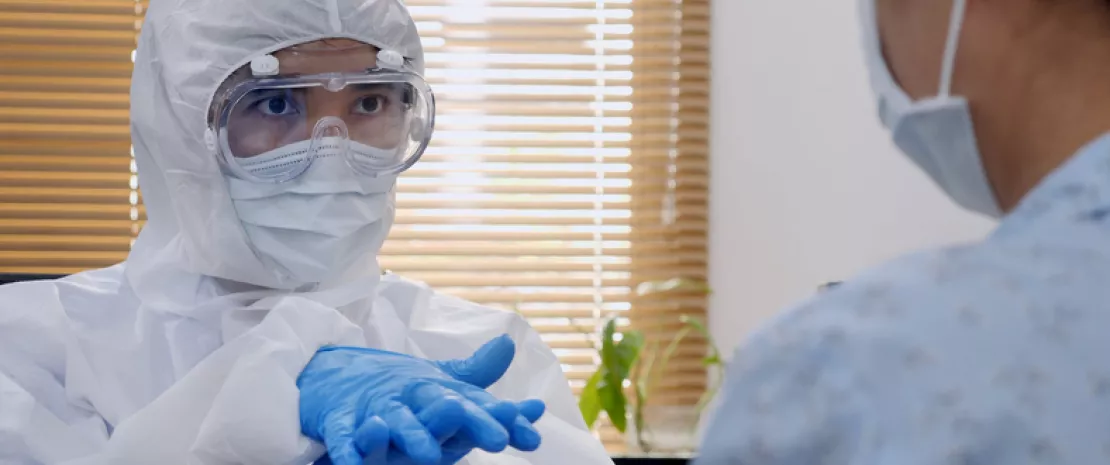COVID-19: are digestive disorders associated with gut microbiota?
Although at present there is nothing to confirm a link between infection and gut microbiota, several signs nonetheless point towards an association with the digestive system. Certain precautionary measures are therefore justified.
- Learn all about microbiota
- Microbiota and related conditions
- Act on your microbiota
- Publications
- About the Institute
Healthcare professionals section
Find here your dedicated section
Sources
This article is based on scientific information

About this article
Fever, cough and respiratory distress are three symptoms of COVID-19, but they are not the only ones. A first study1 has reported that half of patients testing positive for coronavirus also complain of digestive symptoms such as loss of appetite, diarrhea and, to a lesser extent, vomiting or abdominal pain.
Digestive symptoms
Excluding loss of appetite, which is not specific to intestinal disorders, about one in five patients involved this study had strictly digestive symptoms which worsened with the aggravation of COVID 191. The incidence of diarrhea varied widely between studies (2%-34%)1,2 but the genetic material of the virus –or even active virus (i.e. able to spread)– was found in patients’ feces3,4, suggesting that it may multiply in our digestive system. Another study showed an imbalance of the intestinal flora (dysbiosis) in two patients aged 65 and 78 years who subsequently died from COVID 195; however, the link between intestinal dysbiosis and COVID-19 seems of little relevance here since it is well known that elderly people typically display gut flora imbalances6. Lastly, a debate7 has recently kicked off about the potential role played by Prevotella bacteria in the infection, but to date no scientific evidence has confirmed any such role.
At-risk patients
Admittedly, these initial findings are open to criticism, since the studies were carried out in a limited number of patients6, and some of them were not subject to peer review prior to publication6. Despite this, the findings warrant caution. For example, on March 16, 2020, the ANSM (French Agency for the Safety of Medecines and Health Products) enhanced precautionary measures in the case of fecal microbiota transplants in order to prevent intestinal infections due to the transmission of other pathogens through Clostridium difficile treatment. Enhanced precautions will also apply to patients suffering from inflammatory bowel disease, particularly to those treated with immunosuppressants, who are more susceptible to viral infections, even if specific data2 are still lacking. While they are not advised to discontinue immunosuppressive treatment (the risk of flare-up far exceeds other), they must carefully comply with prevention measures2
1. Lei Pan, Mi Mu, Pengcheng Yang et al. Clinical characteristics of COVID-19 patients with digestive symptoms in Hubei, China: a descriptive, cross-sectional, multicenter study.Preproof version. https://journals.lww.com/ajg/Documents/COVID_Digestive_Symptoms_AJG_Preproof.pdf [last consult: 14 april 2020]
2. Ungaro RC, Sullivan T, Colombel JF et al. What Should Gastroenterologists and Patients Know About COVID-19? Clin Gastroenterol Hepatol. 2020 Mar 17. doi: 10.1016/j.cgh.2020.03.020.
3. Gu J, Han B, Wang J. COVID-19: Gastrointestinal Manifestations and Potential Fecal-Oral Transmission [published online ahead of print, 2020 Mar 3]. Gastroenterology. 2020;. doi:10.1053/j.gastro.2020.02.054
4. Holshue ML, DeBolt C, Lindquist S, et al.; Washington State 2019-nCoV Case Investigation Team. First Case of 2019 Novel Coronavirus in the United States. N Engl J Med. 2020 Mar 5;382(10):929-936. doi: 10.1056/NEJMoa2001191.
5. Fei Xiao, Meiwen Tang, Xiaobin Zheng et al. Evidence for Gastrointestinal Infection of SARS-CoV-2. Gastroenterology. 2020 Mar 3 doi: 10.1053/j.gastro.2020.02.055
6. Lilei Yu, Yongqing Tong, Gaigai Shen et al. Immunodepletion with Hypoxemia: A Potential High Risk Subtype of Coronavirus Disease 2019. Unreviewed prepint published on medRxiv. https://www.medrxiv.org/content/10.1101/2020.03.03.20030650v1 [last consult: 14 april 2020]
7. O'Toole PW, Jeffery IB. Gut microbiota and aging. Science. 2015;350(6265):1214–1215. doi:10.1126/science.aac8469
8. https://blogs.mediapart.fr/igaal/blog/210420/la-folle-histoire-de-la-premiere-theorie-globale-sur-le-coronavirus











